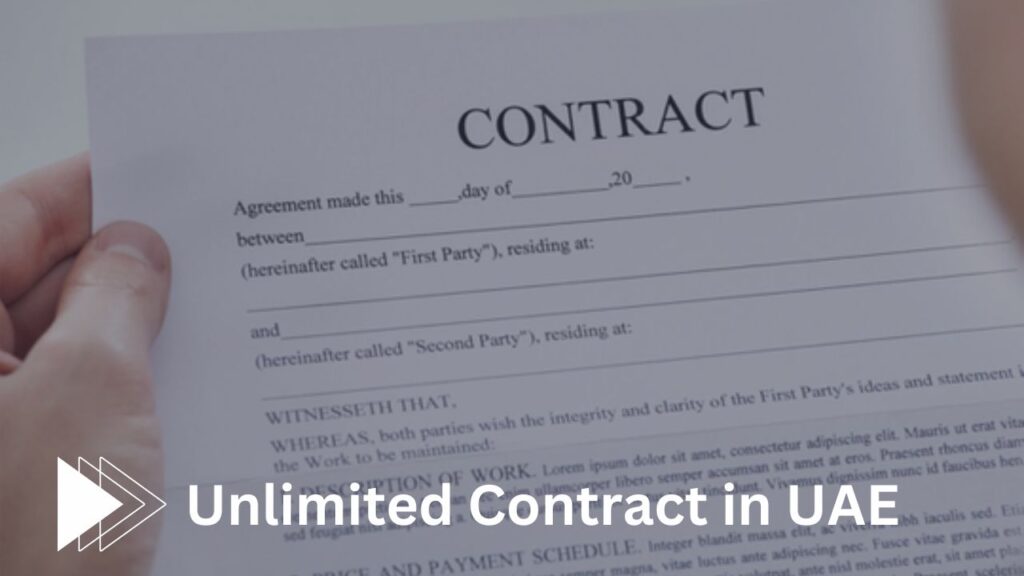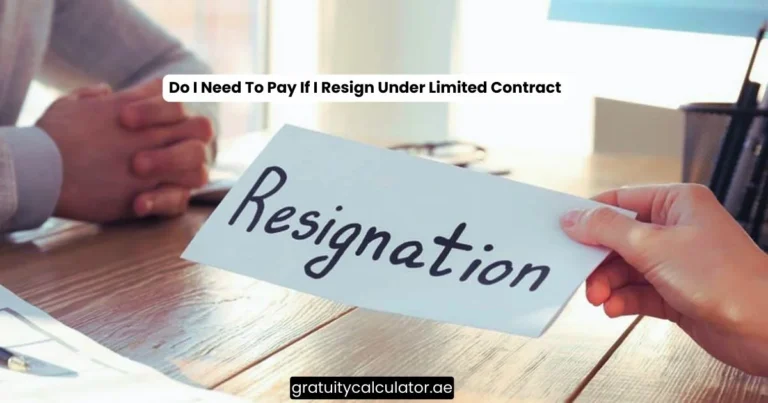Difference Between Limited and Unlimited Contract UAE
Imagine working hard in a foreign land, diligently putting in effort under the terms of Limited and Unlimited Contracts UAE, only to receive peanuts at the termination. Envision yourself living as an expat in a country and being in trouble. These are common scenarios that we hear now and then. And the main reason for these unpleasant incidents is ignorance of laws.

UAE is the hub of expats and is the prime choice of job seekers in the GCC region. And this calls for strict laws and regulations as well. People seeking a job in UAE or currently working as an expat must be well aware of different contract types and labor laws in UAE, especially the difference between limited and unlimited contracts in UAE.
Limited vs Unlimited Contract UAE
There are two main employment contract types in UAE: Limited and Unlimited. The two types differ significantly in terms and conditions, compensations, and regulations related to the termination or end of a contract.
In this article, we will discuss the difference between limited and unlimited contracts and how to maximize your benefits and avoid trouble in each contract type.
What is a limited contract in the UAE?
As the name suggests, a limited contract is an employment contract for a limited duration. Usually, it is implied when employers want to hire people for a specific project or a time-bound task. It has a start and end date mentioned, along with other contract specifications.
Limited contracts are usually of the same length as the UAE resident visa. The contract lasts for a maximum of four years and automatically ends on the mentioned date on the employment contract.
See Also: Can I Resign in Limited Contract?
Renewal of Limited Contract
As mentioned earlier, limited contracts end automatically on the mentioned end date on the contract without any need for notifications from either party. But it is possible to renew the contract, both during and after the contract duration.
If the employer is satisfied with the employee and both parties agree on working together for a longer duration, they can renew the contract. They can sign up for another limited contract or change it from a limited to an unlimited contract.
Termination Conditions and Compensation Deductions in Limited Contract
After understanding the limited-contract meaning and its specifications, it is essential to understand the termination conditions and compensation deductions in a limited contract according to the UAE Labor Law.
The ending date of the working tenure is in the limited contract in UAE. But both the employer and the employee can terminate the contract earlier. In either case, there is some compensation to make up for the loss of earlier termination of the contract.
Early Termination of the Limited Contract by the Employer
When the employer terminates the employee earlier for any valid reason, he is liable to pay three months’ salary as compensation. And if the duration left is less than three months, he is liable to pay the remaining wages.
Along with this compensation, he is liable to provide salary certifications and all the due allowances, including gratuity, unpaid leaves, etc.
See Also: Do I Need To Pay If I Resign Under Limited Contract
Early Termination of Limited Contract by the Employee
If an employee wishes to end the contract before the end date, then he is also liable for some compensation. He must pay half of his three months salary as compensation. And if the duration left is less than three months, he must pay half of the remaining wages. The early termination of the limited contract will also impact his allowances, like gratuity.
However, the employee is liable to serve the notice period as per the contract.
What is an unlimited contract in UAE?
Unlimited contract is the preferred choice of job seekers among the two types of contracts in UAE. It is an employment contract without any defined working tenure. The employee and employer are free to terminate the contract at any time.

Employers initiate unlimited contracts when they are seeking long-term employees and staff members. Which means employees have greater job security and trust. Moreover, it offers more perks and benefits and has fewer restrictions.
Termination Conditions in Unlimited Contract
Unlike limited contracts in the UAE, terminating unlimited contracts is easy.
The employer can terminate the employee due to any valid reason without being liable for any compensation. However, the employer must give the notice period to the employee as per the contract.
If the employee resigns early, he is also not liable to pay any compensation. However, the employee must serve the notice period before leaving the job.
Compensations in Unlimited Contract
The best thing about an unlimited contract in UAE is the compensation. Employees under unlimited contracts get better compensations like sick leaves, travel allowance, etc.
Moreover, if an employee serves for more than five years in the UAE under an unlimited contract, the gratuity per year increases.
See Also: Can I Resign after 6 Months in Unlimited Contract
Key Differences Between Limited and Unlimited Contracts in UAE
After discussing what a limited contract is and what an unlimited contract is in UAE, let us analyze and compare the two types of contracts in UAE to understand the difference between unlimited and limited contracts.
Duration
The first and most obvious difference between the two contract types is their duration.
The limited contract is for a fixed duration only. Meanwhile, the duration for unlimited contract types is not specified.
Purpose
Limited contracts are for project-based jobs. On the other hand, unlimited contracts are for hiring employees for longer durations.
Flexibility
Unlimited contracts offer greater flexibility and are employee-friendly compared to limited contracts in the UAE.
End of Contract
Limited contract type ends automatically on the mentioned date in the contract. In an unlimited contract, the employer or employee has to terminate the contract.
Compensations
Compensation is better for employees in unlimited contracts in UAE, in contrast to limited contracts.
Resignation
Employees can resign from an unlimited contract at any time and are not liable to pay any compensation for contract termination. However, they must serve the notice period as per the contract.
In a limited contract, employees are bound to serve their contract period. They are liable for contract termination compensation for the employer in case of early resignation.
Termination
In an unlimited contract, employers can terminate their employees at any time by giving them a notice period according to the contract. They are not liable to pay any compensation to their employees for termination.

On the other hand, in a limited contract, employers are as bound as employees. They cannot terminate the employee during the contract period. And if they do so, they are liable to pay the compensation.
The Most Recent News Regarding Unlimited Contracts in the UAE
UAE Labor Laws keep on getting modified now and then. If you are an expat living in the UAE or on a job hunt in the UAE, you must keep a close eye on the latest updates.
According to recent amendments in UAE Labor Law, employers in UAE cannot opt for an unlimited contract. They must have to go for a limited contract.
It is disturbing news for people seeking jobs in the UAE. But the good part is that private sector employers can hire employees on long-term contracts and are not bound to just three-year contracts.
Regardless of the duration, all employers now must go for fixed-duration contracts only. The unlimited contract is not an option. And the irony is all employers are also bound to change the contracts of their existing employees from unlimited to limited by December 2023.
SEE ALSO:Domestic Worker Gratuity Calculator UAE
FAQS
The limited contract is project-based and does not tie employers and employees to long-term commitments. Moreover, in case of early resignation and termination, employees and employers have to pay compensation, and both parties are bound to complete the contract.
If your contract has a mentioned start date and end date, it is a limited contract. And if the contract ending date is not there, it is an unlimited contract. There is one significant difference between limited and unlimited contracts.
Yes, if you resign before your contract end date, you must pay half of your three-month salary as compensation. And if the duration left is less than three months, you must pay half of the remaining wages.
Usually, the notice period is 30 days or as per your contract. Employees have to serve the notice period according to their contract.
Yes. According to the latest news, now employers cannot hire employees on unlimited contracts. However, they can opt for long duration fixed contract.
See Also: Jafza Gratuity Rules
Conclusion
Employees and job seekers in UAE must be well aware of the different types of contracts in UAE, i.e., limited and limited contracts. The two types of contracts are not the same and differ significantly in terms and conditions, regulations, and compensations.
People aware of the difference between limited and unlimited contracts usually prefer unlimited contracts. Unfortunately, according to the latest news, the unlimited contract is now not an option for employees. Though this is disturbing news for most expats in UAE, there is still some hope.
UAE allows changing contracts from unlimited to limited and from limited to unlimited. So even if you start your job today with a limited contract, your employer can change it into an unlimited contract if the ban uplifts. So, make an informed decision today!







